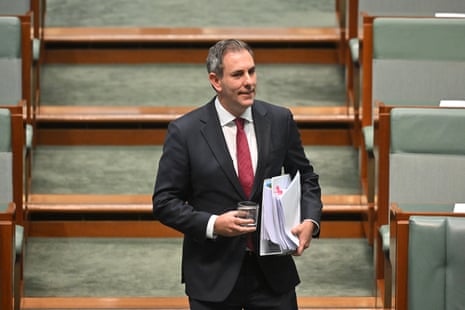Chalmers blames end of energy rebates, rising travel prices and fuel for big leap in inflation
Treasurer Jim Chalmers has blamed the end of state energy rebates, travel prices and fuel for the higher monthly inflation figures released by the ABS.
Inflation jumped to 2.8% in the year to July, from 1.9% in the month before, the highest rate in a year.
Chalmers said those were “volatile and one-off factors” and this was the eighth month in a row that the headline and underlying inflation rates were below 3%.
We know monthly inflation figures can jump around and are less reliable than the quarterly figures because they don’t compare the same basket of goods and services from month to month.
The official quarterly numbers show that both underlying and headline inflation are at their lowest rates in almost four years.
 Treasurer Jim Chalmers. Photograph: Mick Tsikas/AAPShare
Treasurer Jim Chalmers. Photograph: Mick Tsikas/AAPShare
Updated at 23.39 EDT
Key events
Show key events only
Please turn on JavaScript to use this feature
Aly also spoke to what concerns her about the sovereign citizen movement:
I think what it demonstrates is the changing nature of terrorism and violent extremism in not just this country but worldwide as well. It used to be that you could attach terrorism to a particular ideology in a kind of a linear way. And now what we have is a different landscape of terrorism where it might not be aligned to a singular ideology … The thing that I find particularly disturbing is that the sovereign citizens movement is largely, largely embedded in conspiracy theories.
Terrorism in all its forms, historically and most recently, has always an element of conspiracy theories, but in a world where we have rising misinformation, disinformation, the capacity of AI to emphasise and increase misinformation and disinformation, conspiracy theories are more and more becoming part of a radicalising narrative for people.
So I’m very concerned about the sovereign citizens movement and I think it speaks to the much more complex environment in which our security agencies work in because these people are much, much harder to detect and you cannot trait them linearly to a particular ideology or political stance.
Updated at 02.31 EDT
Aly also spoke to the situation in Porepunkah, and sent her condolences to the families of the officers who lost their lives in yesterday’s shooting – Detective Leading Senior Constable Neal Thompson and Senior Constable Vadim De Waart.
I do want to send my condolences to the families of the victims of this man. I’m from a policing family myself. My husband’s a former police, my stepdaughter and her partner are both police officers. We always take time to mourn those who are lost in the line of duty.
Updated at 02.30 EDT
Aly says anti-Semitism ‘bubbling underneat the surface’
Aly says that Australia “absolutely” still has a problem with anti-Semitism, that it’s not just something coming from Iran:
I’ve just spoken in the House about the fragility of social cohesion in this nation. There are periodic episodes of heightened tensions and racism and it’s because we have a gritted-teeth tolerance of difference in this country. I want to change that. I want to make Australians proud of our difference. I want that to be part of our character…
If you look at historically, the most anti-Semitic groups have been the far-right Neo-Nazis. The clue is there in the name, right? And what we’ve seen now is anti-Semitism become more normalised and this is what the Jewish community have been telling me, that it’s become more normalised, but it’s always there, bubbling under the surface. And it’s bubbling under the surface because of the fragility of our social cohesion, so the best thing we can do is target harder, harden our social cohesion, make that part of our character.
Updated at 02.30 EDT
Aly says Coalition attempting to politicise the process of listing a terrorist organisation
Anne Aly, the minister for multicultural affairs, says she is surprised the opposition is seeking to politicise the process of listing a terrorist organisation.
Appearing on ABC’s Afternoon Briefing, Aly was asked about the fact that the Iranian community members told the Australian Senate in 2022 that these officers had questioned and threatened their families in Iran. As a consequence, the recommendation was to list them as a terror group. Was it a mistake that Labor didn’t at the time, despite the warning?
I’m surprised people like Michaelia Cash and people from the opposition are seeking to politicise this because they know full well what the process is for listing a terrorist organisation.
They know full well that the process involves our security agencies, our security apparatus and in the case of listing the IRGC, we need to change the legislation and make that feasible and make that happen. They know there is a process.
… As soon as we got information from our security apparatus, from our security agencies, that the Iranian government was involved in this, with the advice that the IRGC should be listed as a terrorist organisation, we acted and we acted swiftly and in a timely manner.
Updated at 02.15 EDT
 Lisa Cox
Lisa Cox
CFA warns communities in boundary zones to be wary of fire risk
A spokesperson for Victoria’s Country Fire Authority said “while the risk is more pronounced in some areas, in other areas, like the outskirts of Bendigo and Melbourne, the risk sits on the margins of these zones”. They said:
For communities in or near these boundary areas, it’s important to note that fire risk can still increase quickly under hot, dry, and windy conditions.
The Dampier Peninsula, Derby Coast and the Central Kimberley, Little Sandy Desert, and south-eastern Pilbara in Western Australia and the south-eastern agricultural areas of the Murraylands in South Australia are also facing increased risk.
Map illustrating the areas with heightened fire risk.Significant parts of Victoria, including Ballarat and the outskirts of Melbourne and Bendigo, face a heightened risk of bushfires through spring after long term rainfall shortages through large parts of the state. Photograph: AFAC
In Western Australia, seasonal rains have led to increased fuel loads which, coupled with forthcoming warmer and drier conditions, is expected to heighten the chance of fire.
Parts of South Australia could receive above-average spring rainfall, but severe rainfall deficiencies are expected to continue in parts of the Riverland and Murraylands.
Rob Webb, the chief executive of the Australian and New Zealand National Council for fire and emergency services, said people should follow any warnings and advice and have a plan for what they would do in the event of a bushfire.
Updated at 02.03 EDT
 Lisa Cox
Lisa Cox
Bushfire risk rises across Victoria due to lack of rain
Significant parts of Victoria, including Ballarat and the outskirts of Melbourne and Bendigo, face a heightened risk of bushfires through spring after long-term rainfall shortages through large parts of the state.
Although wetter-than-average conditions are expected to continue for much of Australia, the seasonal outlook from state and territory emergency services warns some parts of Western and South Australia could also experience an increased chance of fires.
The higher risk of fire in Victoria covers a large area that takes in drought-affected parts of south-west, west and central Victoria, as well as south-west Gippsland.
Authorities said the increased risk was mostly expected later in spring.
Updated at 02.02 EDT
 Natasha May
Natasha May
Thanks Krishani for taking us through another big day of political news.
Share Krishani Dhanji
Krishani Dhanji
Thank you all for joining me on the blog today, I’ll leave you with the fabulous Natasha May for the rest of the afternoon’s political news.
I’ll see you here bright and early tomorrow!
ShareTl;dr — here’s what happened in question time
The opposition pressed the government on why they didn’t act sooner on listing Iran’s Islamic Revolutionary Guard Corps as a terror organisation.
The government accused the opposition of abandoning bipartisanship on Iran. They also tried to throw Andrew Hastie’s comments of pushing for the listing under the previous Coalition government back at the opposition.
The Coalition then pivoted to playing the rule in, rule out game (similar to yesterday’s tactic) by trying to get the government to rule out tax changes on the family home or the fuel tax credit scheme (the government wasn’t keen to play ball).
Greens MP Elizabeth Watson-Brown asked whether the government would commit to a four-day work week. The government wouldn’t.
Updated at 01.42 EDT
Question time ends
The prime minister takes a final dixer on what the government is doing on the cost of living, and that’s it for question time for today.
Updated at 01.23 EDT

